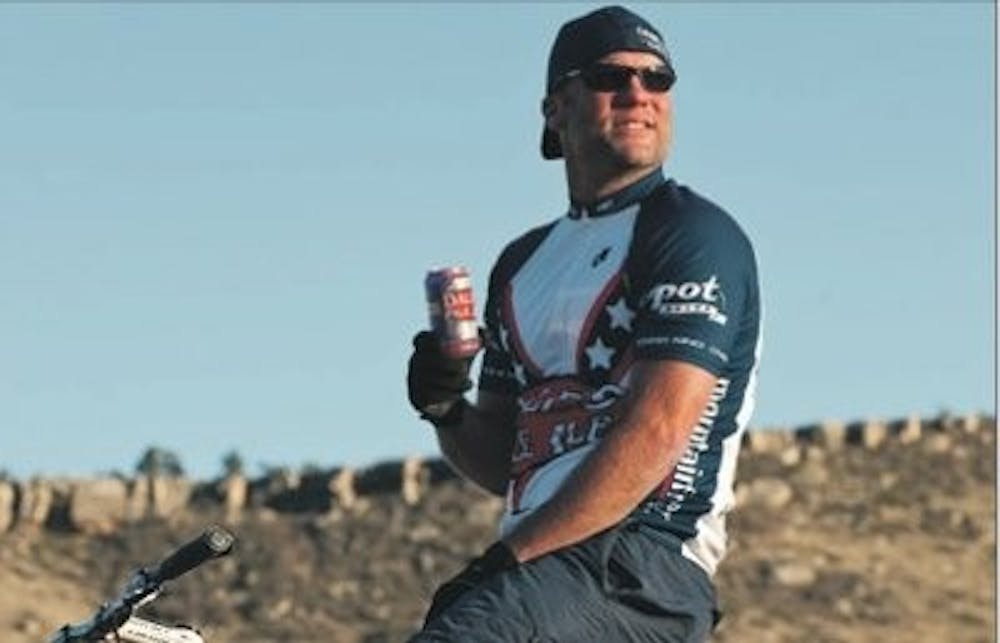For Dale Katechis, founder and owner of Oskar Blues Brewery, the bathtub is only the second strangest place he's ever put craft beer.
Many bar-goers and hop-heads in Auburn know the story of Katechis.
A 1992 Auburn alumnus, Katechis began brewing beer in 1990 in a trailer off Wire Road after getting a home brew kit for Christmas.
Then he began perfecting it.
Katechis' experimental brew became popular with a local home brewing club, and he eventually started brewing larger quantities of beer in his bathtub. Katechis earned a degree in finance from Auburn and moved to Colorado where he started Oskar Blues restaurant. That restaurant became a brew pub, that brew pub expanded into a brewery, and like a beer poured too quickly into a glass, Katechis' success was soon foaming over the rim.
Oskar Blues' rise to pub prominence from a home-brewing kit is remarkable enough; however, Katechis was not just trying to get into the business. He was trying to change it entirely.
In a market where product is heavily judged by the pack- age, Katechis began canning his prized pale ale in 2002, a head-scratching move consid- ering the top beers at the time were all sold in bottles.
"Nobody was doing it at the time," Katechis said. "Cans were frowned upon. The consumer in our industry believed it was an inferior package for craft beer, mainly due to the fact that large domestic brewers that were brewing lager-style beers (were canning) their beer. And craft brewers believed that in order for beer to be high quality, it had to be in a brown bottle only because that's the only vessel a craft beer had been served in other than a keg."
That bathtub brew, now known as Dale's Pale Ale, is the flagship beer of Oskar Blues, and although it's no longer made in the tub, it's recipe has not changed much, according to Katechis. Dale's Pale Ale was named the Top American Pale Ale by the New York Times in 2005 and won a gold medal at the 2010 world Beer Championships.
It was also named world's Best Canned Beer by Details Magazine.
Since first releasing Dale's Pale Ale, Oskar Blues has introduced six more beers. All of them are aggressively hopped, all of them come in cans, and all of that is good for the beer, according to Katechis.
Now he's trying to pour a pint of that knowledge for the consumer.
When beers were first mass-produced, many craft breweries favored green glass bottles. And yet, if a beer sat in those bottles for too long, it would acquire what Katechis called a "skunky taste" as a result of too much sunlight.
Brown bottles then took over the industry and are still a staple of many craft brewers today. However, Katechis argues that cans are the superior way to store beer.
"Brown bottles eliminated a lot of that light," Katechis said. "Well aluminum cans eliminated all of it. It was just the perception that we had to get over."
Since finding this out, he has begun a "debugging process" to show America that a great beer can be bought in a can.
"We decided to dispel that myth once we decided that cans were actually a superior package due to the fact that the beer had never seen sunlight, and the dissolved oxygen levels were lower, and the package was more environmentally friendly than a bottle," Katechis said. "The modern-day aluminum can has always had the water-based lining inside to keep the beer from sitting on metal. The package was really draft-like, and our job once we learned that was to educate the consumer that that was the case, and that's when we began this mission in 2002."
The Hound tavern and restaurant in downtown Auburn was the leading seller of Oskar Blues products in Auburn in 2012, according to owner and beverage director Matt Poirier.
Poirier said Katechis is a pioneer, and he has seen a similar consumer perception problem with wine.
"People have known for years that screw-tops are better for the wine," Poirier said. "They preserve it better. There's no loss of quality. The cork is more likely to fail. All kinds of things can go wrong with the cork. But for hundreds of years, it's been the cork. The idea is that screw-top wines are cheap wines and can't be good. Same thing with cans. Cans have been Budweiser and Bud Light, beers that aren't necessarily known for their quality."
In addition to blocking almost all sunlight and oxygen, the cans' size and shape makes them easier for retailers to store, all the while holding the same amount of beer as a heavier glass bottle.
These days, it seems Katechis' message is catching on.
"A lot of the big guys are following suit now," Poirier said. "A lot of the old-guard craft beer companies are now turning to cans."
And why not?
The modern day can is not only better for the brewery's bottom line, it's better for the beer and all who drink it.
Oskar Blues just recently celebrated its "Canniversary" honoring 10 years of mass producing its beers solely in kegs and cans. The brewery also just opened a new branch in Brevard, N.C. Despite this success, however, Katechis said he will continue to fight America's "brainwashing."
Needless to say, neither his passion nor his beer show any signs of going flat.
Do you like this story? The Plainsman doesn't accept money from tuition or student fees, and we don't charge a subscription fee. But you can donate to support The Plainsman.





